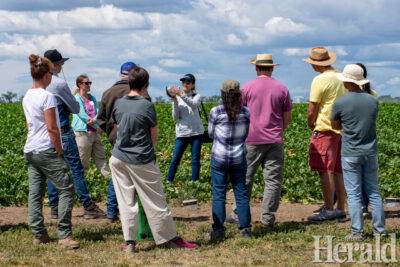Lethbridge College research farm a growing concern
By Delon Shurtz - Lethbridge Herald on July 12, 2023.
 Herald photo by Delon Shurtz
Rezvan Karimi, research scientist with the Mueller Irrigation Research Group, demonstrates during the Lethbridge College's second-annual Farm Field Day how college researchers obtain greenhouse gas samples to quantify nitrous oxide emissions.
Herald photo by Delon Shurtz
Rezvan Karimi, research scientist with the Mueller Irrigation Research Group, demonstrates during the Lethbridge College's second-annual Farm Field Day how college researchers obtain greenhouse gas samples to quantify nitrous oxide emissions.LETHBRIDGE HERALDdshurtz@lethbridgeherald.com
There’s a 385-acre farm just east of Lethbridge that looks like any other farm in the area, at least to the casual observer or anyone who’s not particularly farm savvy.
Perhaps the biggest indication that the farm might be a little different, however, is the variety of crops being grown. When it comes to diversity, this farm is second to none, and it boasts canola, wheat, sugar beets, alfalfa, barley, potatoes and peas, all in a “checkerboard” of growing plots.
Neighbouring farmers likely know about the farm, and some of them may have been on the land Tuesday during Farm Field Day organized by the Lethbridge College’s Centre for Applied Research, Innovation and Entrepreneurship.
The research farm played host to more than 100 people involved in the agriculture industry, including researchers from Olds College and Lakeland College, who shared during the second annual event their own relevant and timely research findings.
“It is a day to showcase all of the applied research that Lethbridge College does in the field of agriculture,” said Megan Shapka , director of applied research operations at the college.
“We’ve also invited guests from other colleges and the University of Lethbridge because it’s all about collaboration and just sharing best practices and innovative ideas for the ag industry, and we’re stronger when we do that together.”
Shapka said the field day brought together a diverse group of industry professionals, including farmers, agronomists and other applied research organizations to share a “cross-pollonization” of ideas and collaboration.
“I don’t think we do innovation, and change the ways that we farm…without bringing all these folks together,” Shapka said.
Because the college’s farm is primarily an irrigation farm, that has been the focus of the Mueller Irrigation Research Group, which, among other things, tests for moisture and determines the best way to apply water on the farm using various equipment for irrigating fields.
“We’re also doing some sampling around greenhouse gases so that we can improve the way that we’re tilling. It’s just really all about that look to the future and sustainable farming practices.”
Shapka said conducting research and sharing its findings is critical for dealing with the many challenges and hurdles facing the agriculture industry.
“I think we all recognize that because of climate change, because of water scarcity, because of food shortages, we have to change the way that we are producing food, storing food, consuming food; we need to rethink that whole process. We play a piece in that by researching what we can in our areas of expertise, and we just share that knowledge and inspire change.”
Shapka pointed out that the relationship between the college and the agriculture industry is a win-win arrangement, and the college does not develop any project unless there is an industry partner involved so both can benefit.
“Things that we’re working on don’t just sit in a lab and get put on a shelf and go in a peer review paper that nobody reads. We’re doing applied research, so industry comes to us with their challenges, we co-create a project and then we try to come up with a solution.”
Shapka noted, for example, that the sugar beet industry loses a lot of sugar beets while they are stored in giant piles following their harvest. Researchers, however, are trying to find ways to reduce the losses.
“Our post-harvest team is looking at ways that we can improve those storage commissions so we are not losing so much of that.”
The college is also a member of the Pan-Canadian Smart Farm Network, which is led by Olds College of Agriculture and Technology to enhance efficiency, sustainability, and resilience in response to emerging opportunities and challenges.
Willemijn Appels, senior research chairperson with the Mueller Irrigation Research Group, said the membership opens a whole new opportunity for regional studies and working with other researchers as they run their own experiments at the College farm.
In addition to collaborating with others in the agriculture industry, Appels said the college farm also provides an opportunity for students to experience farming, and it reaches out to a broader audience to show what applied research is all about.
At the end of the day, Appels hopes the farm, collaborations with industry and membership on the Smart Farm Network, will provide people with the expertise to use new tools and implement strategies within their own operations
“Everyone throws out new technologies all the time, but which ones are good, which ones are reliable and how can you use them? We try to help…with those questions,” Appels said.
Follow @DShurtzHerald on Twitter
24-23




